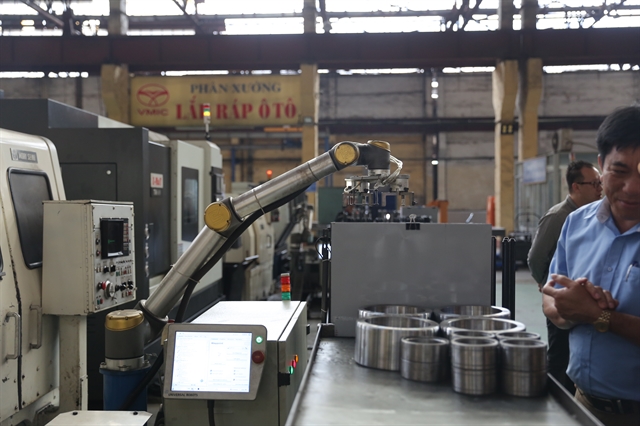“Viet Nam continues to be a key market for UR as automation and robot demand rises,” Darrell Adams, head of Southeast Asia and Oceania at UR told Viet Nam News.

US-owned Universal Robots (UR) – a pioneer and market leader in collaborative robots (cobots) – is keen on the Vietnamese market as the country has a growing demand for cobots as automation becomes increasingly important for businesses.
“Viet Nam continues to be a key market for UR as automation and robot demand rises,” Darrell Adams, head of Southeast Asia and Oceania at UR told Viet Nam News.
The automation and control market in Viet Nam is estimated to be worth US$184.5 million by 2021, Adams cited figures from the US research and consulting firm Frost and Sullivan as saying.
The country was also ranked the seventh largest robot market globally in 2017. Robot sales soared from about 1,600 units in 2016 to almost 8,300 units the following year, driven by the electrical and electronic industry, he said.
And related to growing automation demand, Viet Nam is attracting larger foreign direct investment. In the first five months of this year, FDI reached a four year high of US$16.74 billion.
Out of 19 sectors receiving capital, manufacturing and processing came out on top with $10.5 billion, or 72 per cent of total FDI. These industries are key adopters of cobots. This makes Viet Nam an exciting market for UR, he noted.
However, Adams said, Viet Nam has been slower to adopt cobots compared to its neighbours.
“With recent initiatives by the Government such as the “Made in Viet Nam 4.0 Programme” to prepare the country to be at the forefront of Industry 4.0, we foresee more businesses embracing automation and robotics,” he said, stressing the importance of greater awareness on cobot technology to encourage greater adoption.
He added UR has teamed up with partners to organise seminars and technical workshops to introduce manufacturers to cobots.
The company has also launched the UR Academy to offer free online modules and webinars on cobot programming skills to users, regardless of prior robotics background.
Since its debut in 2017, more than 73,000 users from over 130 countries have participated in the training courses. This is to assist the workforce in adapting to the new technology, he said.
“Since using the cobots, our productivity has increased two and three fold and product quality is now consistent. That has led to a rise in orders as much as 50 to 60 per cent and subsequently, an increase in workers’ income,” Pham Xuan Phi, Chief Executive Office of Vinacomin Motor Industry JSC (VMIC) – a subsidiary of Vinacomin Group – told the press during a trip to his company in Quang Ninh Province on Tuesday.
He said return on investment for such robotic investment is typically between six to eight years, but his company is expected to reach it within just one or two years.
“With the cobots, fewer workers are needed on the factory floor, allowing us to assign some to higher-level tasks, increasing worker satisfaction and reducing the risk of workplace accidents,” he said, adding that in the next few years, VMIC aims to add three to five UR cobots in order to automate more processes in their factories.
Apart from VMIC, Meiko Trading and Engineering Co, a PCB board manufacturer in Viet Nam, has also deployed cobots at its factory.
With 37,000 robots installed worldwide over the past 12 years, UR now makes up 58 per cent of the global market share for cobots – robots designed to work side-by-side and safely with people. — VNS





